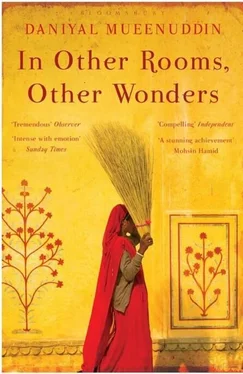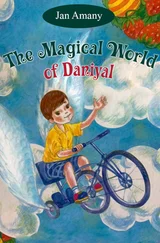Among the possible futures, Lily now recognized the likely one, the one she must avoid. Murad would be rich and powerful, she knew that, having seen him at work here on the farm. He would be shrewd, trusted by men, sometimes warm to her in comradeship, but finally cold, irreproachable. And in the very act of drowning she would be left to bear the blame, to injure him, blindly or by neglect, becoming one of those thin sharp women from the cities who can hold their liquor but are desiccated by it, who are well dressed without taking pleasure in it, living much in London, bored — and ultimately, she hoped, she would depend on this, becoming old and wise, old and self-forgiving.
THERE HE STOOD at the stone gateway of the Harounis’ weekend home above Islamabad, a small bowlegged man with a lopsided battered face. When the American wife’s car drove up, turning off the Murree Road, Rezak saluted, eyes straight ahead, not looking at her. She sat in the back and smiled at him from the milky darkness of the car’s interior. What a funny little man! Once he had happened to be walking past as she was driven through the gate, and she had waved. In the few weeks since, he had waited hours to receive this recognition from her, Friday when the family came, Sunday when they left. He had plenty of time.
The car continued up the winding flagstone drive and disappeared among the rows of jacaranda trees, blooming purple now in late April. Below lay the roadside town of Kalapani, the bazaar pierced by the horns of buses collecting passengers; above stood these walls, which enclosed ten acres of steep land, planted with apples, pine, jasmine, roses, and lilies that the wife had brought from America. The wind blew with a rushing sound through the pine branches and combed the fresh green grass sprouting all over the hillside after the winter rains.
He made himself useful. In May pickup trucks full of summer flowers were brought up from the nurseries that surrounded the city on the plains below. When the first truck arrived he stood at the gate, watching the gardeners unload the pots, handing them down to each other and then carrying them up to the house — the loaded vehicle couldn’t make it up the steep drive. Without asking he passed through the gate, which he had never done before, took one of the clay pots in his arms, and walked up with it, rolling slightly on his down-at-heel shoes.
‘Hey, old man, you’d better leave that before you hurt yourself,’ called a gardener standing in the bed of the pickup.
‘I’m from the mountains, brother,’ Rezak said. ‘I can carry you up on my back, and one of these in each hand.’
The pickup driver, who stood to one side smoking a cigarette, grinned.
The old majordomo, Ghulam Rasool, had strolled down to watch the show, a potbellied figure with a tall lambskin hat resting at a slight angle on a fringe of white hair. He sent one of the gardeners up to get his hookah and, comfortably settling himself in the watchman’s chair by the gate, looked out over the valley below. At midday he said to Rezak, ‘Come on then and break bread with us.’
Rezak looked down at his feet. ‘I’d need to put stones in my gizzard like a chicken to digest the rich food that you good people eat.’
The majordomo tried to convince him, and the gardeners also pressed, but Rezak remained stubborn. ‘You didn’t ask for help, you don’t owe me anything.’
‘Suit yourself then,’ Ghulam Rasool said finally. The gardeners walked up the drive, talking, and Rezak stood watching them, wishing he had accepted. He was alone now. In the distance he could see a swimming pool, with curving sides, overhung by chinar trees and willows. Melancholy invaded him, and also peace, borne by the whirring of cicadas nestled among the rocks that punctuated the grounds of the estate. He took a bag from his pocket, undid the elastic band, and tucked a quid of tobacco in his cheek, chopped green naswar .
In the Kalapani bazaar he ate at his usual teahouse, day-old bread soaked in milk, prescribed by a quack homeopath against a fistula that had tormented him for many years. The waiter brought the sopping bread and, when the crowd subsided, he came over to have a few words, about the flow of tourists up to Murree, more each year, this season begun so early. Lonely as he was, Rezak relied upon his welcome in the teahouse, his connection with it. When the older chickens at the poultry sheds where he worked were culled, Rezak would bring down one of the healthier birds, asking the teahouse to cook it, as a holiday from his bread diet. He shared with whoever was there, insistent, forcing his friend the waiter to eat.
‘There, look, I’ve taken some,’ the waiter would say, pulling off a wing. Even he, hardened by a diet of stale leftovers from the kitchen, was dubious about eating this time-expired bird.
‘No, you have to really eat.’ Rezak even became angry about it once, leaving abruptly, the chicken still on the table.
After finishing his lunch Rezak walked through a government pine forest to the poultry sheds. The owner had bribed the wardens to allow construction extending into the forest, and each summer his men set fires at the base of pines planted by the British a hundred years earlier, in order to kill the trees and open up more space. Rezak came to his home, not the workers’ quarters attached to the sheds, but a hut that he had built for himself, a little wooden cubicle, faced with tin and mounted on thick legs. Several decades before, in his early twenties, he had fallen out with his stepbrothers over shared property up in the mountains, a few acres of land on which they grew wheat and potatoes, bordered by apricot trees. Outmaneuvered, dispossessed, he had come down to the plains, vowing never to see his family again. This box had become his home and consolation. Each place he worked he set it up, and then, when he quarreled with the other workers or the boss, as he invariably did, he would take it apart and cart it away — always he kept a store of money, untouched no matter what, enough to pay for trucking this little house, this nest, to whatever place his heart had set on next. This was his guarantee of independence.
Opening the heavy padlock, he lifted the door hatch and climbed in, tucking his shoes into a wooden box nailed below the cramped hatch. Run off an electrical connection drawn from the poultry sheds, tiny red lights strung all over the ceiling warmed the chamber. He could sit but not stand inside, and had covered the floor with a cotton mattress, which gave off a ripe animal odor, deeply comforting to him. A funnel and pipe served as a handy spittoon, a mirror and shelf allowed him to shave without getting out of bed, an electric fan cooled him. Photographs of actresses plastered the walls and ceiling, giving him company. Fickle and choosy, he shuffled and moved them, discarding one, stripping the photo from the wall with a cold expression. For several months he had been favoring a Pathan actress known as ‘the Atomic Bum’ — who had wagged her way through a string of hit movies in the past year.
A few dats later, loitering around the gates of the Harouni estate again, Rezak decided to go in, stepping through a narrow entry set into the wall. The owners would be in Islamabad for the week, and earlier he had seen the watchman down in the bazaar. By climbing the slope of the mountain opposite, he had observed the household routine, marked the servants’ quarters, watched the owners sitting on a terrace, brightly clothed. Close up the house seemed to him ugly, made of large rough-hewn stones, with a vast wall of glass all across the front, looking out over the valley and down to Islamabad, forty kilometers below. Nothing to it — no metalwork, no paint, no decorative lights, plain, only size to recommend it. The house blended into the landscape, as if it were one of the boulders littering the mountain slope.
Читать дальше












